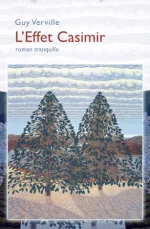
L’Effet Casimir

A retired psychoanalyst, Martha lives peaceful days with three former patients who have become her friends over the years. His happiness could have been complete if the man of his life, the painter Leo Arcand, had not left her five years earlier, after forty years of living together. This autumn morning when the novel begins, Martha makes a decision that will gradually change everyone's habits.
In French only Second edition, revised and expanded. This book was first published by Varia (who has ceased his activities). First ISBN of 2001: 2-922245-42-X. I took back my rights and published in ePub format.
Available only in ePub format from
Kobo | iBook | Kindle (USA) | Kindle (FR) | Nook
Reviews
A finely described daily life
With L'Effet Casimir, Guy Verville proposes a tone and characters different from what he has written so far. Described by its author as a quiet novel, this work combines happiness and sadness, reflections and comedy, and dramatic and earthy characters as quickly as life itself. A story that follows the rhythm of the river on whose banks it takes place: calm and inflexible, sometimes eventful, always an intense reflection of life and things.
If life is an eternal restart, with its ups and downs, false certainties, disappointments and incessant dreams, Guy Verville wanted to grasp the essence of time that passes and shapes the beings who, in turn, shape others as they move back and forth. The Casimir Effect follows the days of a woman, Martha, a former psychologist in her early seventies, still struggling with heartache. Fortunately, she lives in her mansion near the splendour of the river, surrounded by a few former patients who have become her friends.
The subtitle, "Quiet novel," may arouse a slight apprehension about the rhythm of the narrative in the reader. Anyway, "quiet" here manages not to rhyme with boring. However, Verville's challenge was daunting. Talking about everyday life, particularly that of individuals living in the entourage of a dying person (one of Martha's old friends has cancer), could have tired the reader, giving him the unpleasant impression of wasting his time. With The Casimir Effect, this is not the case.
On the contrary, the reflections of Martha, a fine fly - except for her own life - know how to weave a framework from which the reader will have no desire to extract himself, just as curious to hear the monologues of the heroine with his conscience (formidable psychologist's consciousness) as to know the evolution of the beings who inhabit this rural microcosm. The gentleness of these deep friendships created by time and the intimacy between beings who were originally very different, combined with the calming effect of the river's rhythm, power, constancy and omnipresence, create a universe in its own right, both physical and metaphysical. There are real beings to whom it is difficult not to believe or be attached.
Lucienne, the maid in the colours of the countryside, who adds up the lovers despite her age and build; Armand, musician and astrologer who learns to tame her near end; Rémi, an energetic homosexual with a noble heart, who tries to convince himself that love does not exist; Gustave, a tease with tender feelings and finally Martha, intelligent, cultivated, loving, made for happiness, with a fidelity that moves her as much as it prevents her from overcoming her pain and disappointment. All these figures are endearing, and their modest adventures interest as do, for any individual, the stories lived by relatives. Their problems, moods and projects arouse the reader's interest as they are the subject of exceptional sympathy.
It is impossible not to be touched by this old woman who regrets the happiness she experienced with the man she had chosen to love forever. The same is true of Armand's friends' reaction to his death. At first, deeply sad, and jealous of joint complicity, they return to happiness after the fatal hour because the human being is thus made that he cannot resist the desire to be happy.
Guy Verville delivers the joys of everyday life, and its sorrows; in short, he writes about life. And life, like a Narcissus of planetary proportions, likes to read, analyze and contemplate itself when it recognizes itself as precisely depicted, which is true in The Casimir Effect.